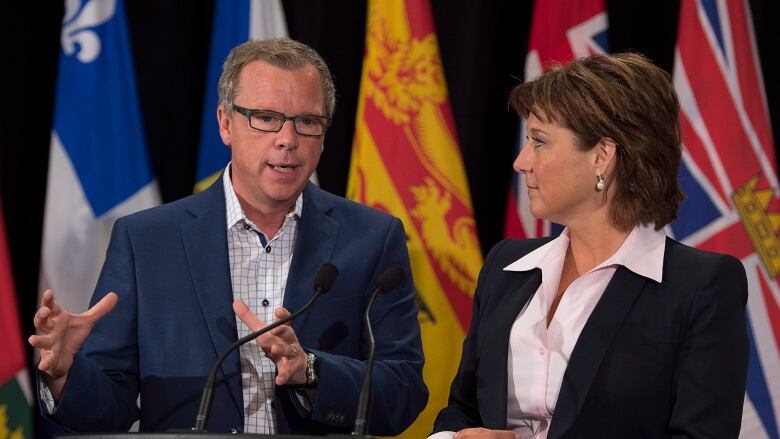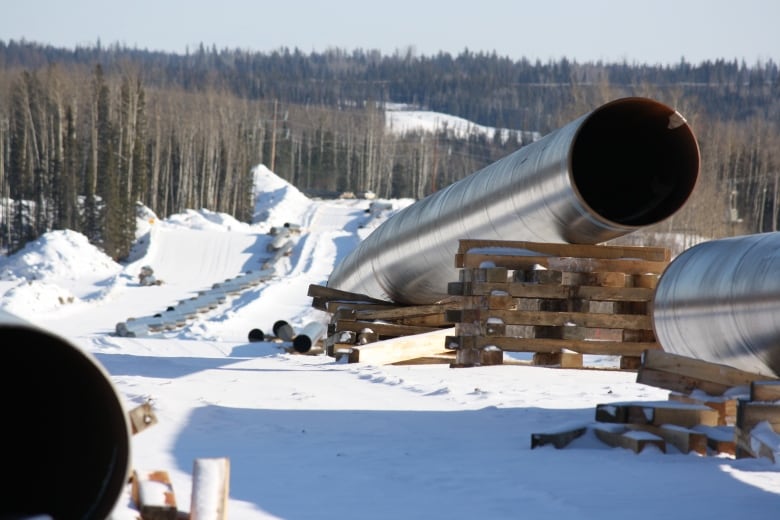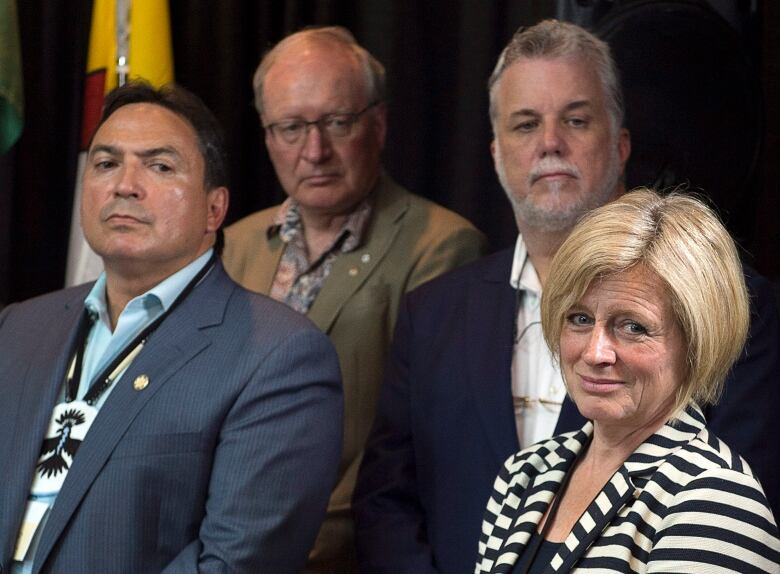Premiers meeting shows national energy policy is 'a mess'
Critics say the agreement is vague and lacks a clear focus

Canada's premiers may have just agreed on anational energy strategy, but whether it will actually make any practical difference remains an open question.
When former Alberta premier Alison Redford toured the country in 2011 promoting a Canadian energy strategy, her vision was straightforward: come up witha national policy on exports of oil, gas and other forms of energy.
- Environmentalists want oilsands out of premiers' Canadian energy strategy
- Nexen pipeline leak in Alberta spills 5 million litres
Redford hit one key point:Canada hasa diversityof energy production.
But that variety does not seem to haveproduceda range of new ideas by the premiersthis week. In public, at least, the discussion at the premiers meeting in St. John's wasmostly about who is for and who is against bitumen-filled pipelines.
Trying to build consensus among the premiers on a national energy strategy is a tall order.Even oil powerhouses Alberta and Saskatchewancouldn't agree.
Alberta Premier RachelNotleycriticizedSaskatchewan Premier Brad Wall's aggressive approach to negotiations. Wall had criticized Notley for allegedlygiving Quebec veto power over future energy pipelines, something she denied.
"Other premiers can do a little bit of showboating," said Notley in an interview with CBC, later suggesting it's best to be mature and collaborative in this process.
A longstanding challenge
The strategy has always faced challenges and detractors, dating back to when formerNatural Resources Minister Joe Oliver said there wasno need at all for such a policy by the provinces.

"I suspect if you took individual premiersaside and asked, 'What's your view on a national energy strategy?'and compared all the views, they would be completely divergent."
Atkinssees a "great disconnect" between the provinces. There are differing views aboutfrackingfor oil andhow to address carbon emissions, for instance, let alone the different economies ofthe "have" and "have not" provinces.
This week'sclash overpipelines and emissions was expected, but for critics, a muchbiggerdisappointmentis that thestrategy hasn't spurred much discussion outside ofexporting oil.
- Difficult to invest in green energy in Canada without Big Oil
- Is Northern Gateway quietly being shelved?
"If you're going to have a true national energy strategy, you can't limit it to just oil and gas," said Atkins."Look at electricity why aren't people talking about the concept of a national electricity grid?"
His sentiments are echoed byJoeArvai, theSvareChair in Applied Decision Research at the University of Calgary.
"I'm quite disappointed. It's the same thing over and over again. Not much discussion about climate," hesaid.
Opportunities lost?
With the election of Rachel Notley in Alberta, Arvai hoped the discussion on the national energy strategy would make some serious headway on carbon emissions. An opportunity lost, he said,for the premiers to get serious about climate change regulations.
Arvaisaysthe discussion should include pipelines, but questions whether theyshould be central to the strategy.
"I don't see China's economy flying right now, so I don't see them as a big customer foroil. The U.S. is a net exporter of oil; I don't see them wanting Canadian oil," said Arvai.
When it comes toexporting oil using pipelines, he said, "We can build this stuff, but I'm not convinced we will see the economic windfall from it that other people are predicting."
Analysts have suggested the oil industry will lose $100 billion in the next 15 yearswithout any new pipelines.

"If we are going to be moving oil across the country, pipelines are the safest and most efficient way to do it, bar none," said Arvai.
"On the other hand, no one has showed me a convincing argument what the economic benefits of moving oil by pipelines will be as compared to using the money used for large pipelines for new initiatives such as developing renewables or developing new ways of getting the oil out of the ground."
Provincial strengths
Arvai's suggestion for a national energy strategy is to see what every province brings to the table, whether it's liquified natural gas in British Columbia or hydroelectricity in Manitoba and Quebec.
Every province could list its energy strengths and weaknesses to see what it can contribute to meet Canada's economic, social and environmental goals. Then the evaluation could take place, identifying which projects will bear fruit.
"How do we think each will perform? What will be the outcomes of economic performance? Will it meet our environmental goals? [This scenario could become] a living process for making decisions," said Arvai.












_(720p).jpg)


 OFFICIAL HD MUSIC VIDEO.jpg)
.jpg)



























































































